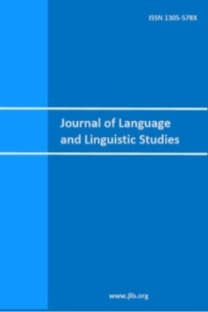Prosodic domains in Kisa
Kisa language, vowel hiatus, vowel height; vowel processes; prosodic domains
___
Akinlabi, A. (1993). Underspecification and the Phonology of Yoruba /r/. Linguistic Inquiry, 24, 139 160.Buchstaller, I., & Khattab, G. (2003). Population Samples. Data without generalisation is just gossip. Pirsing 1991: 55, in Chambers 2003: xix.
Casali, R. F. (1997). Vowel Elision in Hiatus Contexts: Which Vowel Goes? Language, 73(3), 493-534.
Chomsky, N. (1962). The Logical Basis of Linguistic Theory. International Congress of Linguists. Cambridge, Massachusetts: MIT Press.
Creswell, J. W. (1998). Qualitative Inquiry and Research Design: Choosing Among Five Traditions. London: Sage Publication.
Harford, C. (1997). When Two Vowels Go Walking: Vowel Coalescence in Shona. Zambezia, 24, 69 85.
Hayes, B. (1984). The Phonology of Rhythm in English. Linguistic Inquiry, 15, 33-74.
Hyman, L. M. & Katamba, F. (2001). The Word in Luganda. In E. Voeltz (Ed.), Proceedings of Cologne Conference on Typology.
McCarthy, J. (2011). Pausal Phonology and Morpheme Realization. In T. Borowsky, S. Kawahara, T. Shinya & M. Sugahara (Eds.), Prosody Matters: Essays in Honor of Lisa Selkirk. London: Equinox. Available at: http://works.bepress.com/john_j_mccarthy/4.
McCarthy, J. & Prince, A. (1995). Prosodic Morphology. In J. Goldsmith (Ed.), The Handbook of Phonological Theory (pp. 318-366). Cambridge, MA: Blackwell.
Mtenje, A. (2007). On Recent Trends in Phonology: Vowel Sequences in Bantu Languages. SOAS Working Papers in Linguistics, 15, 33-48.
Nespor, M. & Vogel, I. (1982). Prosodic Domains of External Sandhi Rules. In H. van der Hulst & N. Smith (Eds.), The Structure of Phonological Representations (pp. 225-265). Dordrecht: Foris.
Nespor, M. & Vogel, I. (1986). Prosodic Phonology. Dordrecht: D. Reidel.
Pulleyblank, D. (1988). Vocalic Underspecification in Yoruba. Linguistic Inquiry, 19, 233 270.
Pulleyblank, D. (1998). Yoruba Vowel Patterns: Deriving Asymmetries by the Tension Between Opposing Constraints. Paper presented at the South Western Optimality Theory Conference, University of Arizona.
Pulleyblank, D. (2003). Yoruba Vowel Patterns: Asymmetries Through Phonological Competition. Ms, University of British Columbia.
Rosenthall, S. (1994). Vowel/Glide Interaction in a Theory of Constraint Interaction. University of Massachusetts-Amherst Doctoral dissertation.
Sample, W. A. (1976). The Application of Rules in the Phonology of Olukisa. Indiana University Doctoral Dissertation.
Selkirk, E. (1978). On Prosodic Structure and Its Relation to Syntactic Structure. In T. Fretheim (Ed.), Nordic Prosody (pp. 111-140). Trondheim: TAPIR.
Selkirk, E. (1980). Prosodic Domains in Phonology: Sanskrit Revisited. In M. Aronoff & M-L. Kean (Eds.), Juncture (pp. 107-29). Saratoga, CA: Anma Libri.
Selkirk, E. (1984). Phonology and Syntax: The Relation between Sound and Structure. Cambridge, MA: MIT Press.
Selkirk, E. (1986). On Derived Domains in Sentence Phonology. Phonology, 3, 371-405.
Sibanda, G. (2009). Vowel Processes in Nguni: Resolving the Problem of Unacceptable VV Sequences. In M. Matondo, F. Mc Laughlin & E. Potsdam (Eds.), Selected Proceedings of the 38th Annual Conference on African Linguistics: Linguistic Theory and African Language Documentation (pp. 38-55). Somerville: Cascadilla Proceedings Project.
Spencer, A. (1986). Towards a Theory of Phonological Development. Lingua, 68, 3-38.
Spencer, A. (1996). Phonology Theory and Description. Oxford: Blackwell.
Tanner, D. S. (2006). Context Insensitive Vowel Hiatus Resolution in Ciyao. University of Washington working papers in Linguistics Online 25.
Vaux, B., & Cooper, J. (2005). Introduction to Linguistic Field Methods. Muenchen: LINCOM GmbH Publisher.
- ISSN: 1305-578X
- Yayın Aralığı: Yılda 4 Sayı
- Yayıncı: Hacettepe Üniversitesi
Deconstructing applied linguistics conference paper titles: A syntactic analysis
Joseph B. A. AFFUL, Christopher ANKOMAH
Pragmatics of overlapping talk in therapy sessions
Foreign language learning effort levels of students in English for Specific Purposes
Issra PRAMOOLSOOK, Ahmad Amin DALİMUNTE
Teachers’ perceptions of the role of parental involvement in teaching English to young learners
The impact of L1 ınterference on foreign language writing: A contrastive error analysis
The metadiscursive aspects of advice giving: hedging and boosting in an agony aunt’s column
Evaluation of the English language coursebooks used at the Turkish public elementary schools
Mehdi SOLHİ, Meryem SAK, Şeyda ŞAHİN, Selin YILMAZ
Rezky Pratiwi BALMAN, Sangmok LEE
Considerations on the new curriculum of English Language Teaching Programmes
